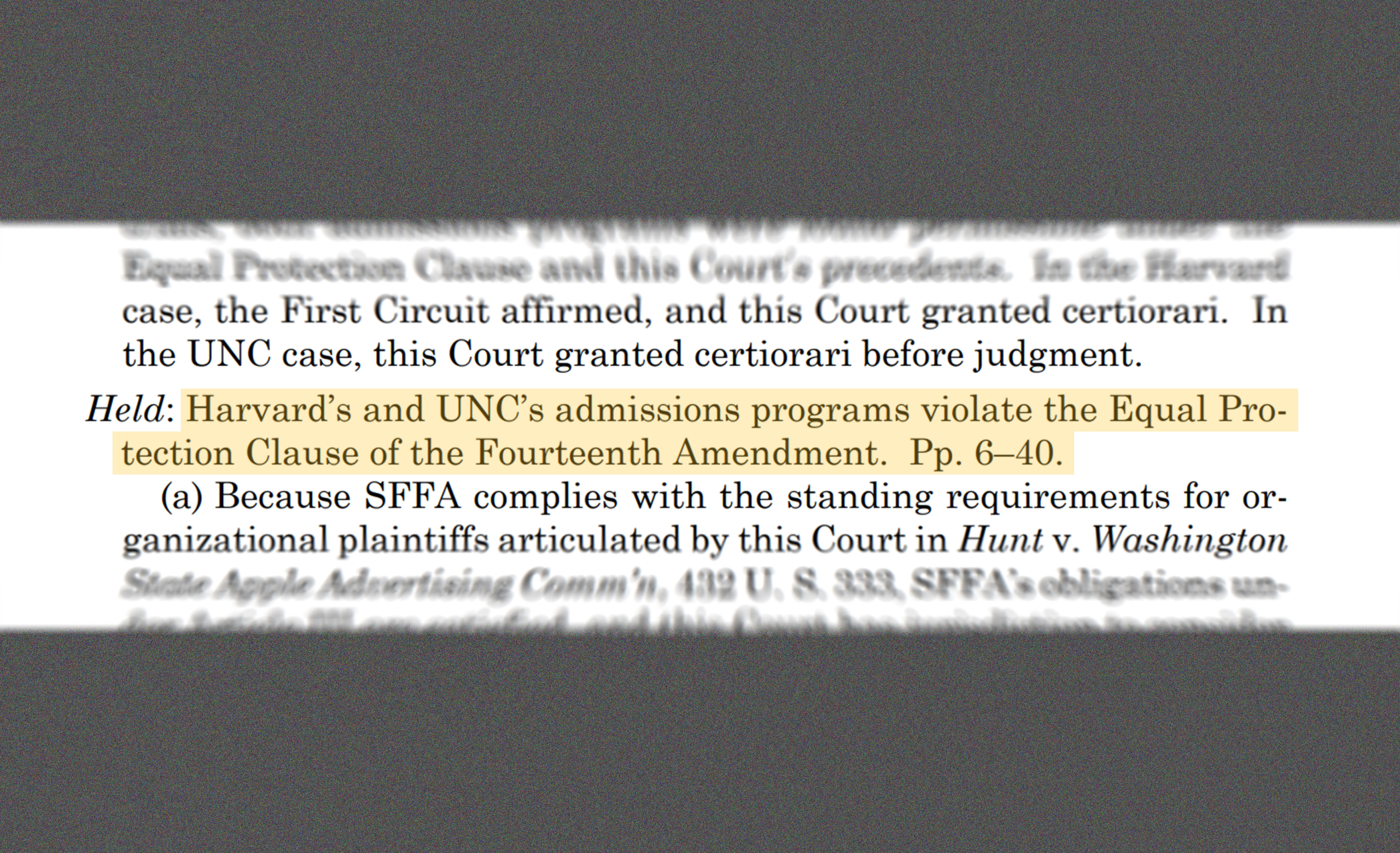Follow live updates.
The Supreme Court struck down affirmative action by a vote of 6-3 Thursday, forcing universities across the country to rethink their race-conscious admissions programs.
President Carol Folt called the decision “very disappointing,” in a statement posted to Instagram and Twitter Thursday morning, writing that “each of our students, faculty and staff has earned a place here and contributes to creating one of the most stimulating and creative educational communities in the world.”
“This decision will not impact our commitment to creating a campus that is welcoming, diverse, and inclusive to talented individuals from every background,” Folt wrote. “We will not go backward.”
The ruling — a largely expected move — found that Harvard University and the University of North Carolina’s admissions processes “unavoidably employ race in a negative manner” and “involve racial stereotyping,” Chief Justice John Roberts Jr. wrote.
It is not yet clear what the decision means for USC. California banned affirmative action from all public institutions in 1996 with Proposition 209, but private universities were still at liberty to employ race-conscious admissions programs.
The University did not comment further when asked about plans to continue enrolling a diverse student body, with a spokesperson saying only that the “statement … from Dr. Folt is the statement from the university.”
In a letter to the School of Cinematic Arts, posted to Instagram Thursday afternoon, Dean Elizabeth Daley assured students, faculty and staff that “today’s Supreme Court ruling prohibiting race-conscious admissions will not diminish our School’s commitment to recruiting and enrolling the diverse storytellers and media scholars our industry desperately needs.”
“Each of our students is chosen to join their SCA cohort in recognition that their lived experience contributes to their talent as storytellers, media makers and scholars,” Daley wrote. “The bottom line is that our deep commitment to diversity and inclusion will not change.”
A statement from the Black Student Assembly, posted to the organization’s Instagram account Thursday afternoon, called the decision “shameful and disheartening,” saying it “represents another blow to civil rights that reinforces systemic barriers and undermines centuries of progress for Black and Brown people.”
“We must remember that affirmative action wasn’t created because Black students could not thrive and excel under merit based systems,” the statement read. “It was created because the system has never been merit based … This attack on affirmative action frames anti-racist policies and laws as punitive to White Americans rather than a promotion of universal equality.”
Julie Posselt, associate dean of the Graduate School, said she received the news of the ruling with “unsurprised disappointment,” in an interview with the Daily Trojan.
“Many of us … were anticipating this would be the outcome,” Posselt said. “Nevertheless, it is always disappointing to see this kind of an outcome in a world where what we are looking for, often, are tools to manage racial inequalities — not to have them taken away.”
Posselt noted that, in the states that have already issued bans on race-conscious admissions, “diversity drops significantly.”
Nine states — Arizona, California, Florida, Idaho, Michigan, Nebraska, New Hampshire, Oklahoma and Washington — have instituted bans. Despite efforts to circumvent them with other approaches, universities consistently failed to reach their previously set diversity targets, according to a Wall Street Journal analysis published Thursday. Applicants who identify as Black, Latine or Indigenous would suffer the greatest losses, the Journal found; Posselt also concurred that “all of the evidence supports that view.”
“We can anticipate that it will be much more difficult to admit the same diversity that we have had for the last several years at USC,” Posselt said. “But we have excellent leaders in Admissions and Enrollment [Services], who are committed to diversity and who are committed to using every tool at our disposal.”
Examples of such tools, Posselt said, included admissions processes that centered more on financial aid rather than in-built “racial biases,” the elimination of standardized test score requirements — for now, USC runs on a test-optional policy — and, as implemented at the UCs, evaluation rubrics with “a more systematic set of criteria” with which to evaluate applicants. While Posselt declined to “speak for USC” as to whether it would take a similar direction, she said places “that have had race-conscious admissions eliminated … tend to move in fairly similar ways.”
“In moments like this, we see that universities tend to become more cautious than even the law requires,” Posselt said. “It will be very important for administrators, general counsels, communications officers and others to very clearly understand what the law requires — and what the law does not require — and to stem the potential loss of diversity, to not go beyond the requirements of the new decision.”
Sparsh Sharma contributed reporting.





